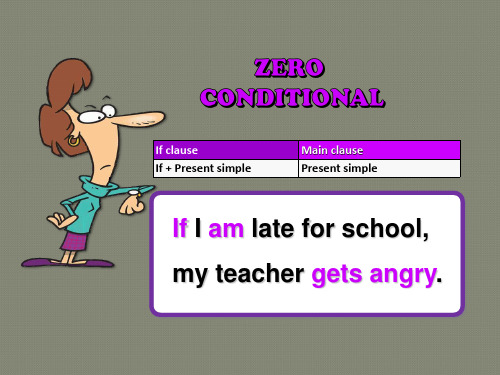高中英语语法if条件句If_Clauses
- 格式:ppt
- 大小:1.69 MB
- 文档页数:21

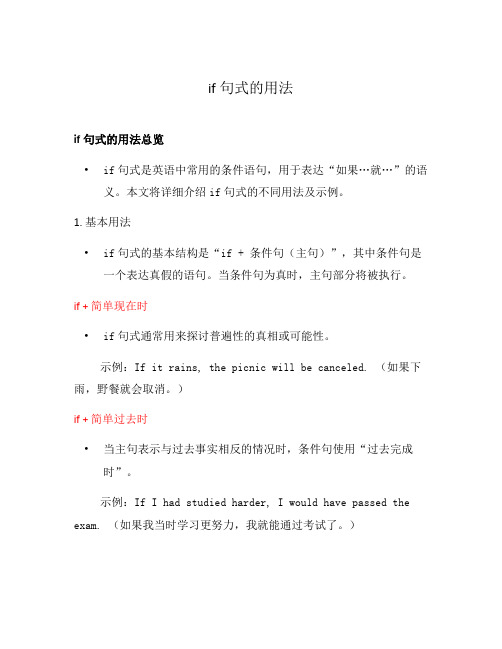
if句式的用法if句式的用法总览•if句式是英语中常用的条件语句,用于表达“如果…就…”的语义。
本文将详细介绍if句式的不同用法及示例。
1. 基本用法•if句式的基本结构是“if + 条件句(主句)”,其中条件句是一个表达真假的语句。
当条件句为真时,主句部分将被执行。
if + 简单现在时•if句式通常用来探讨普遍性的真相或可能性。
示例:If it rains, the picnic will be canceled. (如果下雨,野餐就会取消。
)if + 简单过去时•当主句表示与过去事实相反的情况时,条件句使用“过去完成时”。
示例:If I had studied harder, I would have passed the exam. (如果我当时学习更努力,我就能通过考试了。
)2. 引导if句式的词•if句式可以由多种引导词来引导,区别在于表达的情境和意义。
unless•unless相当于if…not,表示“除非”。
示例:Unless you hurry up, we will miss the train. (除非你快点,否则我们会错过火车。
)in case•in case 表示“以防万一”,它引导的if句式表示提前采取的行动。
示例:Take an umbrella in case it rains. (带把伞以防下雨。
)provided/providing (that)•provided/providing (that) 表示“只要”,引导的if句式多用在正式场合。
示例:You can go in, provided that you show your ID. (只要你出示身份证,你可以进去。
)3. if句式与虚拟语气•if句式常与虚拟语气搭配使用,表示假设、愿望、建议等感情态度。
if + 过去完成时 + would + 动词原形•if句式中的过去完成时表示与过去事实相反的情况,would表示对未来的推测或假设。

"If" 是一个连词,在英语语法中用来引导条件语句。
它可以在句子中引入一个条件状语从句(conditional clause),表示假设或条件,并且与主句(main clause)构成条件句(conditional sentence)。
条件句可分为三类:1. 第一类条件句:表示假设是真实的、可能会发生的情况,形式为:If + 现在时态,主句+ 现在时态(If + 主语+ 现在时态,主语+ 现在时态)例如:- If I have time, I will go to the gym tonight.(如果我有时间,我今晚会去健身房。
)即:假如我现在有时间,那么今晚我就会去健身房。
2. 第二类条件句:表示假设是不真实的、不可能会发生的情况,形式为:If + 过去时态,主句+ 过去完成时态(If + 主语+ 过去时态,主语+ 过去完成时态)例如:- If I had studied harder, I would have passed the exam.(如果我学得更用心些,我就能通过这次考试了。
)即:实际上我没通过考试,而且我没学得用心,但是如果我学得更用心,我就可以通过考试。
3. 第三类条件句:表示假设即使是真实的,也不会对结果产生影响的情况,形式为:If + 过去完成时态,主句+ 过去完成时态(If + 主语+ 过去完成时态,主语+ 过去完成时态)例如:- If I had taken that job, I would have moved to California.(如果我接受了那份工作,我就会搬到加利福尼亚去了。
)即:我最后没有接受那份工作,所以我也没有搬去加利福尼亚; 但即使我接受了那份工作,我也会搬到加利福尼亚。

英语语法副词性从句有哪些常见的类型副词性从句是一个从属从句,用作副词在句子中的作用。
它可以修饰谓语动词、形容词或副词,并提供关于时间、地点、原因、结果、条件、目的、方式等方面的信息。
常见的副词性从句包括以下类型:1. 时间副词从句(Time Adverbial Clauses):时间副词从句用来表示句子中的时间关系,回答“什么时候”、“多久”、“何时”等问题。
常见的时间副词从句引导词有:when(当)、while (当……的时候)、before(在……之前)、after(在……之后)、since(自从)、until(直到)、as(当)、whenever(无论何时)等。
例如:- I will call you when I arrive.(我到达时会给你打电话。
)- They had already left before we arrived.(我们到达之前他们已经离开了。
)2. 地点副词从句(Place Adverbial Clauses):地点副词从句用来表示句子中的地点关系,回答“在哪里”、“到哪里”等问题。
常见的地点副词从句引导词有:where(在哪里)、wherever (无论哪里)等。
例如:- She went to the park where she met her friends.(她去了公园,在那里她遇到了她的朋友。
)3. 原因副词从句(Reason Adverbial Clauses):原因副词从句用来表示句子中的原因关系,回答“为什么”等问题。
常见的原因副词从句引导词有:because(因为)、since(因为)、as (因为)、so that(以便)、in order that(为了)等。
例如:- He didn't go to work because he was sick.(他因为生病所以没去上班。
)4. 结果副词从句(Result Adverbial Clauses):结果副词从句用来表示句子中的结果关系,回答“结果是什么”等问题。
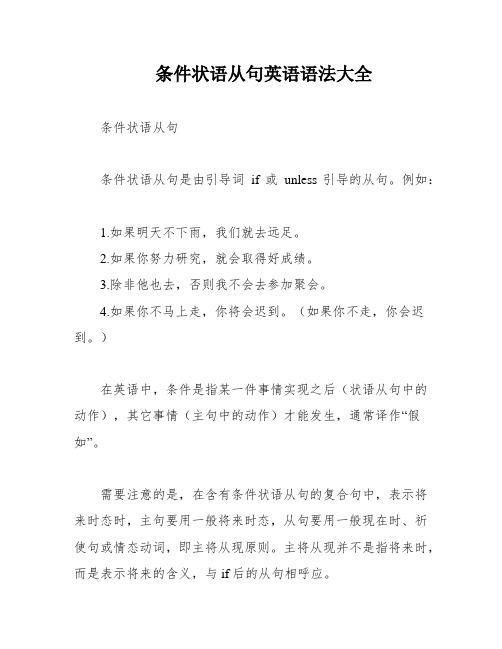
条件状语从句英语语法大全条件状语从句条件状语从句是由引导词if或unless引导的从句。
例如:1.如果明天不下雨,我们就去远足。
2.如果你努力研究,就会取得好成绩。
3.除非他也去,否则我不会去参加聚会。
4.如果你不马上走,你将会迟到。
(如果你不走,你会迟到。
)在英语中,条件是指某一件事情实现之后(状语从句中的动作),其它事情(主句中的动作)才能发生,通常译作“假如”。
需要注意的是,在含有条件状语从句的复合句中,表示将来时态时,主句要用一般将来时态,从句要用一般现在时、祈使句或情态动词,即主将从现原则。
主将从现并不是指将来时,而是表示将来的含义,与if后的从句相呼应。
条件状语从句类型if是条件状语从句最常用的连词,表示在某种条件下某事很可能发生。
例如:1.如果你请他帮忙,他会帮你的。
2.如果你考试不及格,你会让他失望。
if引导的条件状语从句既可以将从句放前面,也可以将从句放后面。
例如:“如果天下雨,我们就不玩了”可以转化为“We will。
playing if it rains.”此外,if从句还可以表示不可实现的条件或根本不存在的条件,即一种虚拟的条件或假设,从句多用一般过去时或过去完成时。
例如:表示可能实现的条件,主句用一般将来时,从句用一般现在时。
例如:If it rains tomorrow。
we will stay at home。
如果明天下雨,我们会待在家里。
非真实条件句则表示假设的情况,分为虚拟条件句和虚拟结果句。
虚拟条件句表示与现实相反的情况,主句用would/could/might+动词原形,从句用过去时或过去完成时。
例如:If I had more time。
I would travel around the world。
如果我有更多时间,我会周游世界。
虚拟结果句则表示与现实相反的结果,主句用过去时,从句用would/could/might+动词原形。
例如:If I had studied harder。

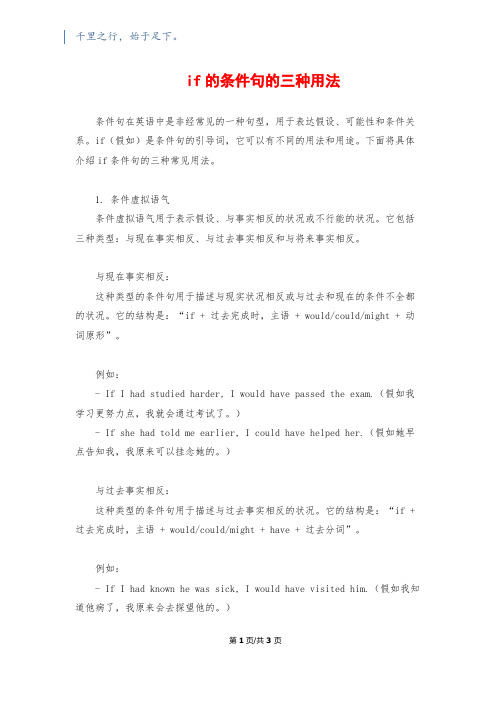
千里之行,始于足下。
if的条件句的三种用法条件句在英语中是非经常见的一种句型,用于表达假设、可能性和条件关系。
if(假如)是条件句的引导词,它可以有不同的用法和用途。
下面将具体介绍if条件句的三种常见用法。
1. 条件虚拟语气条件虚拟语气用于表示假设、与事实相反的状况或不行能的状况。
它包括三种类型:与现在事实相反、与过去事实相反和与将来事实相反。
与现在事实相反:这种类型的条件句用于描述与现实状况相反或与过去和现在的条件不全都的状况。
它的结构是:“if + 过去完成时,主语 + would/could/might + 动词原形”。
例如:- If I had studied harder, I would have passed the exam.(假如我学习更努力点,我就会通过考试了。
)- If she had told me earlier, I could have helped her.(假如她早点告知我,我原来可以挂念她的。
)与过去事实相反:这种类型的条件句用于描述与过去事实相反的状况。
它的结构是:“if + 过去完成时,主语 + would/could/might + have + 过去分词”。
例如:- If I had known he was sick, I would have visited him.(假如我知道他病了,我原来会去探望他的。
)第1页/共3页锲而不舍,金石可镂。
- If the weather had been better, we might have gone to the beach.(假如天气好些的话,我们或许会去海滩的。
)与将来事实相反:这种类型的条件句用于描述与将来事实相反的状况。
它的结构是:“if + 过去完成时,主语 + would/could/might + 动词原形”。
例如:- If I had more money, I would travel around the world.(假如我有更多的钱,我就会周游世界。
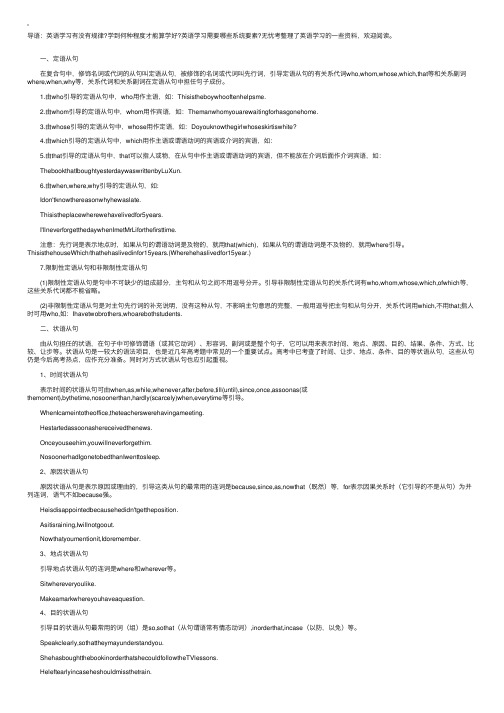
导语:英语学习有没有规律?学到何种程度才能算学好?英语学习需要哪些系统要素?⽆忧考整理了英语学习的⼀些资料,欢迎阅读。
⼀、定语从句 在复合句中,修饰名词或代词的从句叫定语从句,被修饰的名词或代词叫先⾏词,引导定语从句的有关系代词who,whom,whose,which,that等和关系副词where,when,why等,关系代词和关系副词在定语从句中担任句⼦成份。
1.由who引导的定语从句中,who⽤作主语,如:Thisistheboywhooftenhelpsme. 2.由whom引导的定语从句中,whom⽤作宾语,如:Themanwhomyouarewaitingforhasgonehome. 3.由whose引导的定语从句中,whose⽤作定语,如:Doyouknowthegirlwhoseskirtiswhite? 4.由which引导的定语从句中,which⽤作主语或谓语动词的宾语或介词的宾语,如: 5.由that引导的定语从句中,that可以指⼈或物,在从句中作主语或谓语动词的宾语,但不能放在介词后⾯作介词宾语,如: ThebookthatIboughtyesterdaywaswrittenbyLuXun. 6.由when,where,why引导的定语从句,如: Idon'tknowthereasonwhyhewaslate. Thisistheplacewherewehavelivedfor5years. I'llneverforgetthedaywhenImetMrLiforthefirsttime. 注意:先⾏词是表⽰地点时,如果从句的谓语动词是及物的,就⽤that(which),如果从句的谓语动词是不及物的,就⽤where引导。
ThisisthehouseWhich/thathehaslivedinfor15years.(Wherehehaslivedfor15year.) 7.限制性定语从句和⾮限制性定语从句 (1)限制性定语从句是句中不可缺少的组成部分,主句和从句之间不⽤逗号分开。
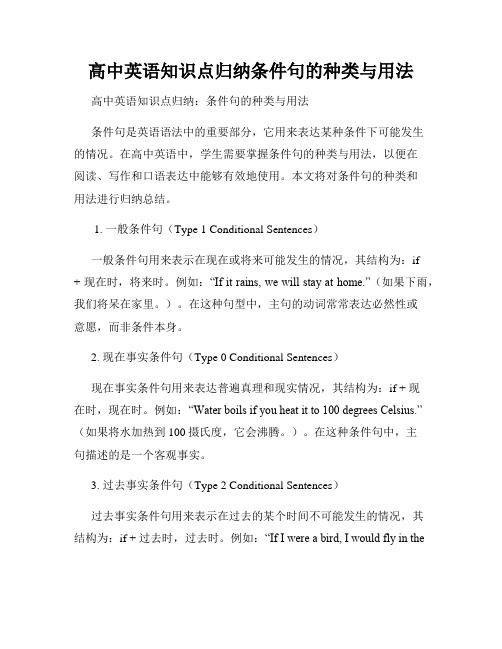
高中英语知识点归纳条件句的种类与用法高中英语知识点归纳:条件句的种类与用法条件句是英语语法中的重要部分,它用来表达某种条件下可能发生的情况。
在高中英语中,学生需要掌握条件句的种类与用法,以便在阅读、写作和口语表达中能够有效地使用。
本文将对条件句的种类和用法进行归纳总结。
1. 一般条件句(Type 1 Conditional Sentences)一般条件句用来表示在现在或将来可能发生的情况,其结构为:if+ 现在时,将来时。
例如:“If it rains, we will stay at home.”(如果下雨,我们将呆在家里。
)。
在这种句型中,主句的动词常常表达必然性或意愿,而非条件本身。
2. 现在事实条件句(Type 0 Conditional Sentences)现在事实条件句用来表达普遍真理和现实情况,其结构为:if + 现在时,现在时。
例如:“Water boils if you heat it to 100 degrees Celsius.”(如果将水加热到100摄氏度,它会沸腾。
)。
在这种条件句中,主句描述的是一个客观事实。
3. 过去事实条件句(Type 2 Conditional Sentences)过去事实条件句用来表示在过去的某个时间不可能发生的情况,其结构为:if + 过去时,过去时。
例如:“If I were a bird, I would fly in thesky.”(如果我是一只鸟,我会在天空中飞翔。
)。
在这种条件句中,主句的动词通常使用“would”来表示与现实相反的情况。
4. 过去不可能条件句(Type 3 Conditional Sentences)过去不可能条件句用来表达在过去某个时间已经无法改变的情况,其结构为:if + 过去完成时,过去完成时。
例如:“If I had studied harder, I would have passed the exam.”(如果我学习更努力,我就能通过考试。



千里之行,始于足下。
if从句的三种用法if从句是英语语法中常见的一个句子结构,用于表示假设、条件或可能性。
依据具体的语境和意义,if从句有三种常见的用法:条件句、假设句和虚拟语气句。
下面将具体介绍这三种用法。
一、条件句(Conditional Sentences)条件句用于表示某种条件下的结果或后果。
它由if引导,分为三种类型:零条件句、一般条件句和虚拟条件句。
1. 零条件句(Zero Conditional Sentences)零条件句表示事实真实的条件和结果,表示的是普遍真理或状况。
它的结构通常是:if + 现在时,现在时。
例如:- If you heat ice, it melts.(假如加热冰,它会溶化。
)- If it rains, the ground gets wet.(假如下雨,地面会变湿。
)2. 一般条件句(First Conditional Sentences)一般条件句表示可能发生的条件和结果,表示的是将来可能发生的状况。
它的结构通常是:if + 现在时,将来时。
例如:- If it rains, I will stay at home.(假如下雨,我会呆在家里。
)3. 虚拟条件句(Second Conditional Sentences)虚拟条件句表示不太可能实现的条件和结果,表示的是与现实相反的状况。
它的结构通常是:if + 过去时,would + 动词原形。
第1页/共3页锲而不舍,金石可镂。
例如:- If I had a lot of money, I would travel around the world.(假如我有很多钱,我会环游世界。
)二、假设句(Suppositional Sentences)假设句用于表示假设、猜想或非真实状况。
它由if引导,通常是对将来可能的状况进行推想或假设。
1. 假如假设是可能的(Possible Condition)这种状况下,if从句和主句中的动词形式一般都使用现在时。

if引导的条件状语从句if1) 用法:(1)条件状语从句通常由连词if引导,意为“如果、假如”,主句不能用be going to表示将来,而应该用shall,will。
If you leave now, you are never going to regret it. (错误)If you leave now, you will never regret it. (正确)(2)if “如果”,引导条件状语从句,主句用一般将来时,从句则用一般现在时,如:If it rains tomorrow, I shan’t climb the hills.(3)另外,主句是祈使句或含有情态动词,从句也用一般现在时。
如:Please call me if he comes next Sunday.Can you call the policeman if you are in the trouble.注意宾语从句中的if与条件状语从句if的区别。
宾语从句中的if“是否”相当于whether,引导宾语从句,时态需根据语境确定。
如果主句用一般现在时,从句可以根据具体情况选用时态,如果主句用一般过去时,从句必须用过去式的某种形式。
I don't know if it will rain tomorrow. 我不知道明天是否会下雨。
Our teacher said there was going to be a football match the next month.我们说下月将有场足球比赛。
【边学边做】用括号内所给词的正确形式填空。
1. What will you buy if you ________(have)a lot of money?2. If it ________(not snow)tomorrow, we will feel unhappy.3. You mustn’t go to school if you ________(be)still in bed.4. If he _______(be)at home at that time, he would know it.5. Please show me the way if you ________(know)it.6. You will hurt your teeth if you ________(eat)too much candy.7. If you gave me a toy car, I _________(be)very happy.8. I would get the prize if I _________(work)hard.9.If she ______ (finish ) work early ,she ______(go) home.10.If the weather______(be)fine,we_______(go)for a walk .11. If I_____(have) time tonight ,I _______(finish) the book I’m reading.12. If it ______(rain) next weekend , we_______(not be able to ) plant the vegetable .13. If it_______(rain),we______(stay) at home .14.If she______(arrive) ,she _____(phone) me .15. If he_____(call),tell him I’ll ring back .二、用所给词的适当形式填空1. If you ________(feel) tired, you _________ (have) to have a rest.2. Where _____ he ____(see) the film if he _________(have) time?3. If there ____ (be) fewer trees, there _______ (be) more pollution.4. He ___ (dress) more casually if he ___ (not work) on weekends.5. If Marcia _______ (live) alone, she _______ (keep) a pet parrot.6. Lana _____ (buy) a new dress if the old one ____ (be) out of style.7. The twins _______ (fight) if they__________ (argue).8. I ______ (have) a bake sale if I ____ (need) money for education.9. Peter ____ (send) me a beautiful souvenir if he ____(tour) Spain.10. If Mr. Green _______ (say) I am hard- working, my parents ___ (feel) glad.11. I ______ (go) to the beach if it________ (not rain) this week.12. _____they ___ (have) a match if the P.E. teacher __ (be) busy?13. He ____ (write) a letter to his grandparents if he ____ (get) his report card this week.14. If she ______ (get) up late, she _____ (not catch) the early bus.15. Peter ____ (major) in English if he ____(pass) the exams in Peking University.二、完成句子1. 他如果看电视太久了,他的父母会不高兴。


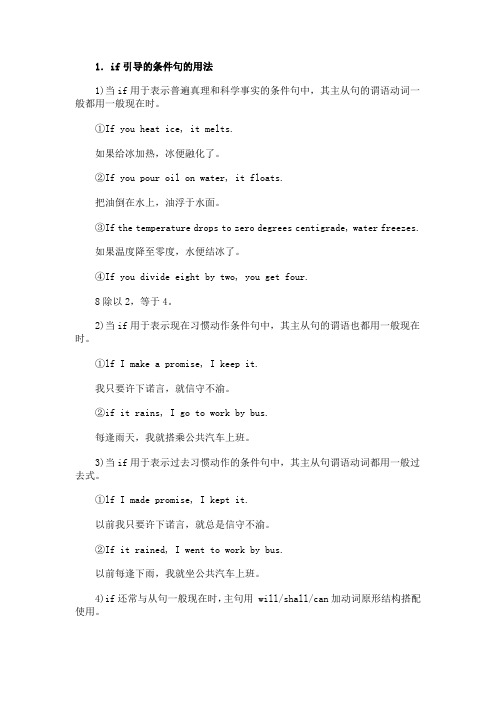
1.if引导的条件句的用法1)当if用于表示普遍真理和科学事实的条件句中,其主从句的谓语动词一般都用一般现在时。
①If you heat ice, it melts.如果给冰加热,冰便融化了。
②If you pour oil on water, it floats.把油倒在水上,油浮于水面。
③If the temperature drops to zero degrees centigrade, water freezes.如果温度降至零度,水便结冰了。
④If you divide eight by two, you get four.8除以2,等于4。
2)当if用于表示现在习惯动作条件句中,其主从句的谓语也都用一般现在时。
①lf I make a promise, I keep it.我只要许下诺言,就信守不渝。
②if it rains, I go to work by bus.每逢雨天,我就搭乘公共汽车上班。
3)当if用于表示过去习惯动作的条件句中,其主从句谓语动词都用一般过去式。
①lf I made promise, I kept it.以前我只要许下诺言,就总是信守不渝。
②If it rained, I went to work by bus.以前每逢下雨,我就坐公共汽车上班。
4)if还常与从句一般现在时,主句用 will/shall/can加动词原形结构搭配使用。
①If you go to England, you will have to learn English .如果你到英国去,就必须学英语。
②If it is fine tomorrow , we can have a picnic somewhere .如果明天晴天,我们可以去野餐。
5)if从句还常出现以下结构,主句祈使句,从句一般现在时。
①If you wake up before me, give me a call.如果你比我醒得早,就叫醒我。

英语语法if从句If clauses, also known as conditional clauses, are an integral part of the English language. They are used to express a condition or a hypothetical situation and the resulting consequence. The structure of an if clause typically consists of two parts: the "if" clause, which states the condition, and the main clause, which expresses the result or the outcome. The if clause is often referred to as the "dependent" or "subordinate" clause, while the main clause is the "independent" or "principal" clause.There are several types of if clauses in English, each with its own specific structure and use. The most common types are the zero conditional, the first conditional, the second conditional, and the third conditional.The zero conditional is used to express a general truth or a factual relationship between two events. The structure of the zero conditional is "if + simple present, simple present." For example, "If water reaches 100 degrees Celsius, it boils." In this case, the condition (water reaching 100 degrees Celsius) is always true, andthe result (the water boiling) is a known fact.The first conditional is used to express a possible future situation and its likely outcome. The structure of the first conditional is "if + simple present, will + verb." For example, "If it rains tomorrow, I will take an umbrella." In this case, the condition (it raining) is a possibility in the future, and the result (taking an umbrella) is a likely outcome.The second conditional is used to express a hypothetical or imaginary situation and its possible consequence. The structure of the second conditional is "if + simple past, would + verb." For example, "If I had more time, I would travel to Europe." In this case, the condition (having more time) is not a reality, and the result (traveling to Europe) is a hypothetical outcome.The third conditional is used to express a past hypothetical situation and its hypothetical consequence. The structure of the third conditional is "if + past perfect, would have + past participle." For example, "If I had studied harder, I would have passed the exam." In this case, the condition (studying harder) is a past hypothetical situation, and the result (passing the exam) is a hypothetical outcome.In addition to these main types of if clauses, there are also variations and combinations of these structures. For instance, the mixedconditional, which combines the second and third conditional, can be used to express a hypothetical situation in the present or future with a hypothetical consequence in the past. The structure of the mixed conditional is "if + past perfect, would + verb" or "if + simple past, would have + past participle." For example, "If I had studied harder in college, I would be working at a better job now."Another variation is the inverted conditional, where the main clause comes before the if clause. This structure is often used in formal or literary writing for emphasis or rhetorical effect. For example, "Would I have passed the exam if I had studied harder?"The use of if clauses in English is not limited to these specific structures. They can also be used in combination with other grammatical constructions, such as modal verbs, past tenses, or gerunds, to express a wide range of hypothetical or conditional scenarios.Moreover, if clauses can be used in various contexts, from everyday conversations to academic and professional writing. They are particularly useful in expressing logical reasoning, making predictions, and discussing hypothetical situations. In formal writing, if clauses can help establish causal relationships, present counterarguments, or explore alternative scenarios.The mastery of if clauses is crucial for non-native English speakers to communicate effectively and accurately in a wide range of situations. Understanding the different types of if clauses, their structures, and their appropriate usage is essential for developing proficiency in the English language.In conclusion, if clauses are a fundamental aspect of English grammar that allow speakers to express conditional statements, hypothetical scenarios, and logical reasoning. By familiarizing oneself with the various types of if clauses and their corresponding structures, learners can enhance their ability to communicate effectively and engage in more nuanced and sophisticated conversations in English.。
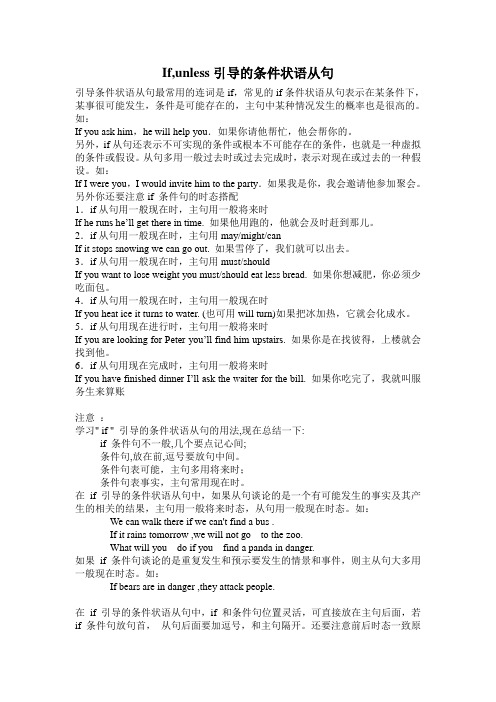
If,unless引导的条件状语从句引导条件状语从句最常用的连词是if,常见的if条件状语从句表示在某条件下,某事很可能发生,条件是可能存在的,主句中某种情况发生的概率也是很高的。
如:If you ask him,he will help you.如果你请他帮忙,他会帮你的。
另外,if从句还表示不可实现的条件或根本不可能存在的条件,也就是一种虚拟的条件或假设。
从句多用一般过去时或过去完成时,表示对现在或过去的一种假设。
如:If I were you,I would invite him to the party.如果我是你,我会邀请他参加聚会。
另外你还要注意if 条件句的时态搭配1.if从句用一般现在时,主句用一般将来时If he runs he’ll get there in time. 如果他用跑的,他就会及时赶到那儿。
2.if从句用一般现在时,主句用may/might/canIf it stops snowing we can go out. 如果雪停了,我们就可以出去。
3.if从句用一般现在时,主句用must/shouldIf you want to lose weight you must/should eat less bread. 如果你想减肥,你必须少吃面包。
4.if从句用一般现在时,主句用一般现在时If you heat ice it turns to water. (也可用will turn)如果把冰加热,它就会化成水。
5.if从句用现在进行时,主句用一般将来时If you are looking for Peter you’ll find him upstairs. 如果你是在找彼得,上楼就会找到他。
6.if从句用现在完成时,主句用一般将来时If you have finished dinner I’ll ask the waiter for the bill. 如果你吃完了,我就叫服务生来算账注意:学习" if " 引导的条件状语从句的用法,现在总结一下:if 条件句不一般,几个要点记心间;条件句,放在前,逗号要放句中间。
